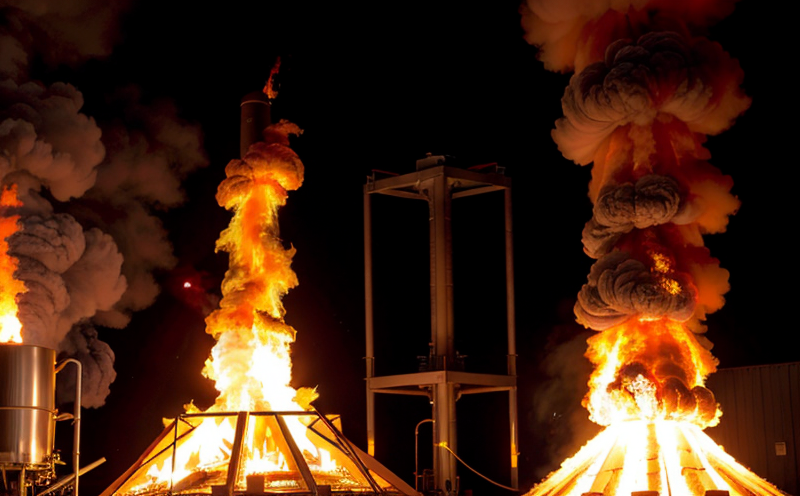JIS L1091 Flammability Testing of Textiles
The JIS L1091 standard is an essential part of Japan's regulatory framework aimed at ensuring textiles are safe for use, particularly in regards to flammability. This test method evaluates the resistance of textile materials to igniting and flaming under controlled conditions. Compliance with this standard is crucial for manufacturers and suppliers who sell products within Japan or need to ensure their goods meet international quality benchmarks.
The JIS L1091 test involves subjecting textiles to specific heat sources, which ignite the material after a specified exposure time. The primary objective is to determine how easily the textile will catch fire when exposed to an open flame and whether it can self-extinguish once removed from the source of ignition. This testing procedure helps identify potentially hazardous materials that could pose risks in various environments.
Flammability tests are critical for a range of industries including apparel, automotive interiors, furniture manufacturing, home textiles, and more. Ensuring compliance with JIS L1091 not only protects consumers but also demonstrates adherence to international quality standards, enhancing the reputation of manufacturers globally. By conducting these rigorous tests early in the product development cycle, companies can pinpoint any potential issues before proceeding further into production.
The process typically begins by preparing samples according to specified dimensions detailed within JIS L1091. These specimens are then subjected to a preheating stage followed by exposure to an open flame for a set duration. Once ignited, the behavior of each sample is carefully observed until it either self-extinguishes or continues burning beyond defined limits.
For accurate and consistent results, specialized equipment such as calorimeters equipped with standard heat sources like gas flames are used. Calorimetry allows precise measurement of heat released during combustion, which can be correlated back to the flammability properties of individual textiles. Understanding these metrics is vital for tailoring future designs or selecting alternative materials that may offer better performance.
Compliance with JIS L1091 ensures that textile products meet stringent safety requirements set forth by regulatory bodies in Japan. However, it’s important to note that this standard represents just one aspect of overall quality assurance processes required for successful market entry into countries like Japan or when exporting internationally. Additional considerations might include other national standards such as those published by ASTM (American Society for Testing Materials) or ISO (International Organization for Standardization).
To achieve reliable test outcomes, it is advisable to consult with experienced laboratories that specialize in conducting JIS L1091 tests. These labs employ highly skilled technicians who understand the nuances of the standard and can provide valuable insights into optimizing designs based on preliminary test results.
Benefits
- Ensures compliance with Japanese regulatory standards
- Enhances product safety for consumers
- Demonstrates adherence to international quality benchmarks
- Identifies and rectifies potential hazards early in the design process
- Facilitates smoother market entry into Japan or other regions
- Aids in optimizing textile designs based on test results
- Builds trust with customers by showcasing commitment to safety standards
Eurolab Advantages
At Eurolab, we pride ourselves on providing top-tier flammability testing services that meet and exceed the strictest industry standards. Our team of experts ensures precise execution of every test according to JIS L1091 guidelines while delivering accurate results in a timely manner.
We offer several advantages over competitors:
- Comprehensive testing capabilities covering all relevant parameters
- State-of-the-art equipment that guarantees consistent and reliable outcomes
- Experienced technicians with deep knowledge of local regulations
- Customized solutions tailored to unique client requirements
- Rapid turnaround times without compromising on quality
- Comprehensive reporting options including detailed analyses and recommendations
By choosing Eurolab for your JIS L1091 testing needs, you can be confident that your textiles will not only comply with Japanese standards but also meet broader international expectations. Our commitment to excellence ensures that every product leaving our labs is safe, reliable, and ready for market success.
Environmental and Sustainability Contributions
In addition to ensuring safety, JIS L1091 flammability testing plays an important role in promoting sustainable practices within the textile industry. By identifying materials that pose minimal risk of fire hazards, we help reduce waste associated with product recalls due to non-compliance issues.
Moreover, this testing encourages manufacturers to explore eco-friendly alternatives whenever possible. For instance, natural fibers such as cotton and linen often exhibit better flammability properties compared to synthetic ones like polyester. By prioritizing these sustainable options during development stages, companies not only enhance product safety but also contribute positively towards global environmental goals.
At Eurolab, we recognize the importance of integrating sustainability into our services. Therefore, when conducting JIS L1091 tests, we actively seek opportunities to recommend more environmentally friendly materials or production methods without sacrificing performance standards.





